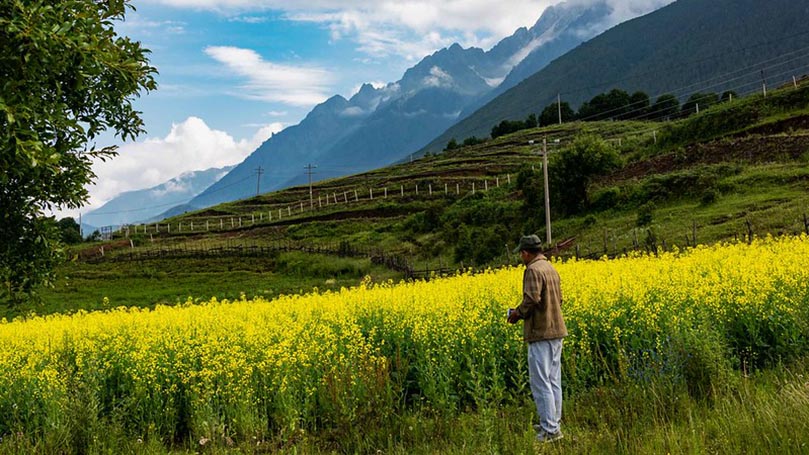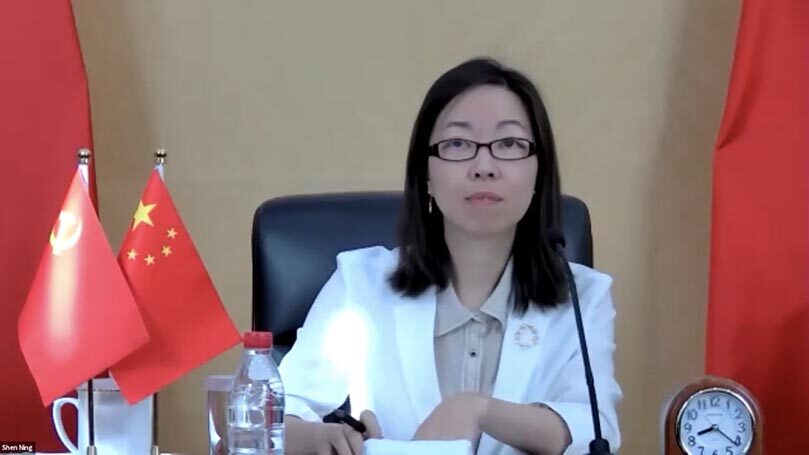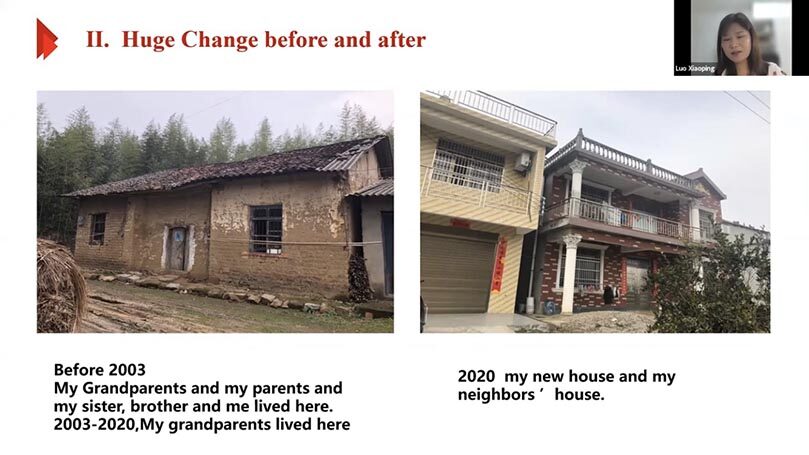
Earlier this year, China announced that it had eliminated extreme poverty in late 2020. How this remarkable achievement came about was the topic of a CPUSA webinar held on September 26.
“China: From Hunger and Famine to Feeding Everyone” featured Shen Ning, chief of the North American Bureau of the Communist Party of China (CPC) International Department; Norman Markowitz, professor at Rutgers University; Dr. Luo Xiaoping, a sociologist from North China Electric Power University; and Tings Chak, a writer from Tricontinental: Institute for Social Research.
The webinar began with a broad overview of Chinese history to provide context for China’s achievement. Norman Markowitz explained that Imperial China, though feudal, was a very advanced society and at one point one of the wealthiest countries in the world. But under the Qing Dynasty, which ruled from 1644 to 1912, China began to decline. The Qing was soon targeted by imperialist powers, culminating in imperialist wars of aggression and the start of many unequal treaties that China was forced to sign at the point of a gun. These treaties saw massive profits surrendered in “reparations” to the imperialists.
Entire regions of China were stolen such as Hong Kong, Macau, and Taiwan by Great Britain, Portugal, and Japan respectively. Imperial China fell during the Xinhai revolution of 1911, followed by the Warlord era that saw China divided, the United Front period when the allied Chinese Nationalists (Kuomintang) and the Communists forced out the warlord regime (often called the Beiyang Republic), the betrayal of the Communists by the Kuomintang, the start of World War II, which really began in China, and the fall of the Kuomintang government in 1949.
After outlining China’s history, Markowitz, a member of the CPUSA, said that we have a lot to learn from China’s poverty alleviation, noting that President Johnson’s War on Poverty failed to tackle many of the systemic problems of poverty that are inherent to capitalism. Markowitz stated that each country must seek its own road to socialism, and just as China seeks to build socialism with Chinese characteristics, American Communists must seek to build socialism with American characteristics based on our own national conditions. But despite our different national conditions, both American and Chinese communists are united and linked by the struggle for socialism.

Shen Ning began her remarks by thanking Markowitz for his overview of history and stating that “we are the luckiest generation in Chinese history,” echoing the feelings of many Chinese people who belong to a generation that does not know the war or suffering of older generations. Shen then delved into the specifics of the poverty alleviation program, one which saw the population living in extreme poverty dropping from 99 million at the end of 2012 to 5.5 million by late 2019; by November of 2020, that number would be zero. All 128,00 impoverished villages and 832 officially designated poor counties got rid of poverty.
Living standards for the poor have increased dramatically; per capita disposable income of the rural poor increased from 6,079 RMB (939.41 USD) in 2013 to 12,588 RMB (1,945.26 USD) by 2020. Poor households now have adequate food, housing, and clothing all year round as well as better access to education. Shen told the audience that there are no longer dropouts in school due to financial difficulties. Basic medical insurance now covers over 99% of the population. New infrastructure such as highways and railways are brought to the villages, as well as improved electricity, plumbing, and communications. Ninety-eight percent of poor villagers now have access to fiber-optic communication systems. All of this increased the flow of movement, goods, services, technology, and knowledge to the rural areas.
Shen said that those who are lifted out of poverty adopt a new mindset, calling the process a “profound revolution.” Formerly impoverished villagers have higher aspirations and want to better their knowledge. Comrade Shen attributed this monumental victory over extreme poverty to four points.
1. People-centered philosophy
a. The CPUSA’s unofficial slogan, “people before profits” (or “people and planet before profits”) is shared by our comrades and counterparts in China. The people-centered philosophy drives the CPC and has allowed China to not only achieve large-scale economic growth, enabling it to become the second-largest economy in the world, but also eliminate absolute poverty and double the life span of the Chinese people within a generation.
b. The U.S. mainstream media presents the Communist Party of China as a top-down, monolithic organization that rules by might and ignores public opinion for the “greater good.” This could not be further from the truth. The CPC makes use of public opinion polls, surveys, the decisions of grassroots democratic meetings at the village level, and firsthand experiences of local party branches who work with the villagers.
c. More than 1,800 CPC members and officials have lost their lives due to sickness and injuries while working in rural China to serve rural communities in the battle against poverty.
2. Development
The root cause of poverty is inadequate development, and a tool used for fighting poverty is reform. Any institutional barriers to poverty alleviation can be removed if need be. The reforms and opening up spearheaded by Deng Xiaoping in 1978 have led to rapid growth, which has allowed for large-scale development projects.
3. Letting the poor play the principal role
a. Shen explained that the poverty alleviation program was not just about the government helping peasants out of poverty, but also giving the peasants and poor people the tools to lift themselves out of poverty. This is done by education initiatives, training workshops, subsidies, and jobs rather than grants. So rather than simply “throwing money” at a problem, the CPC can both provide the infrastructure and send party secretaries and cadres to villages to assist, but peasants and poor people must want to transform their lives.
b. Considering that so much American anti-communism revolves around the idea of a “nanny state” being inconsistent with the American idea of hard work and the ability to “pull oneself up by their bootstraps,” it was very interesting to see that Chinese socialism places as much value on government spending and programs as much as individual hard work and self-transformation.
4. Marshaling all resources
The leading role the CPC plays in China means that they can marshal huge amounts of people power and resources, which the U.S. government does only during wartime. But the CPC’s success lies not just in human power; the party’s successful inner workings and organizational efforts also play a role.
Shen also talked about the role the CPC’s International Department plays in poverty alleviation. For lunch at the department’s cafeteria, a different kind of fruit is offered every day to the staff. Sometimes apples, sometimes bananas, etc., but since last year, the cafeteria has offered apples week-long. This is because the department buys the apples from an orchard in one of the formerly impoverished counties that the department is paired with to assist. The staff and officials at the International Department will buy crafts and products from the county for gifts for foreign friends. Shen said that this meant a lot to her because it shows that everyone has a role to play in the fight against poverty.

Dr. Luo Xiaoping offered a unique perspective into the poverty alleviation program, as her hometown in Qi Chun County, Hubei Province, was one of the villages lifted out of poverty. Dr. Luo’s story showcased her experience with the poverty alleviation campaign: she showed the audience a picture of her 2003 family home, a one-story brick house with a sheet-metal roof, and a photo of her new two-story home built in 2020. Luo then explained the methods used in her hometown to eliminate poverty:
- Identify the poor accurately
- Arrange targeted programs
- Utilize capital efficiently
- Take household-based measures
- Dispatch party secretaries based on village conditions
- Achieve set goals
In Luo’s hometown, village party leaders are chosen based on their commitment to the work, and often those who are picked are members who themselves were in poverty but lifted themselves out of it. Examples of village party secretaries are veterans, returning migrant workers, business people, heads of farming co-ops, and college graduates. These party secretaries were assigned to live with the peasants and work with them. Party secretaries and resident working teams are key to the grassroots poverty alleviation fight.
Along with the arrival of 197 party secretaries at Luo’s county came massive infrastructure projects, including the construction of new roads and bridges in her village. In addition to building infrastructure, the peasants cultivated new land and started to grow traditional Chinese herbs, which peasants could sell at the new agricultural trade market. Dr. Luo’s nephew once could not attend school but now attends kindergarten. Rural hospitals and healthcare improved. Peasants are given matching pensions with loading policies at a lower rate. Peasants who lived in inaccessible areas with difficult, dangerous terrain were relocated to new homes, which came with solar panels and power and were located in areas where peasants could make a better living.
Dr. Luo listed five measures for poverty eradication:
- boosting the economy to provide more job opportunities,
- relocating poor people from inhospitable areas,
- compensating for economic losses associated with reducing ecological damage,
- improving education in impoverished areas, and
- providing subsistence allowances for those who are unable to shake off poverty through their own efforts.
Dr. Luo concluded that the Communist Party’s leadership with its socialist policies that put people first is the number one reason this colossal feat of abolishing extreme poverty was possible. Her grandparents, who died last year, were born in the 1920s and lived through the harsh experiences Markowitz outlined. They saw the changes in China firsthand and were thankful for and supportive of the Communist Party. Dr. Luo was a farmer when she was young but now has her doctorate and teaches at a university. This sort of advancement would have been unthinkable for her grandparents—a reminder of Shen Ning’s statement, “We are the luckiest generation in Chinese history.”
Also speaking at the webinar was a special guest, Tings Chak, a writer from Tricontinental: Institute for Social Research and co-author of an excellent report titled Serve the People: The Eradication of Extreme Poverty in China. Tings Chak found that, rather than being a one-off, the poverty alleviation program is one in a series of campaigns to eliminate poverty that began since the founding of the People’s Republic of China (PRC) in 1949. Many people believe there is a split within China after Chairman Mao died in 1976 and the reform and opening up in 1979, concluding that there are “two China’s”—Mao’s and Deng’s. However, Tings argued that this is a false narrative, and the experience of eradicating extreme poverty is a process in socialist construction.
Each era of the PRC’s history had its own methods of poverty alleviation (land reform, economic reform, and now the poverty alleviation approach). Tings credited the success of the program to the grassroots strength the CPC enjoys, as well as the ability of the CPC to mobilize all sectors of the population to fight poverty. Poverty alleviation is not just a “cash payment program” typical of a welfare state: The peasants are engaging in their own liberation and self-transformation.
The webinar was truly a wonderful experience; I say this as both a viewer and as one of the volunteers on the Communist Party USA Peace and Solidarity Commission’s China Subcommittee that helped organize it. Dialogue between the Chinese and American people is positive for everyone involved, and more of these kinds of discussions are needed to advance U.S.-China friendship. There is no reason the United States cannot be friends and even allies with China. There are many areas where we can cooperate and work together, such as climate change, global poverty, the pandemic, and world peace. The sky is truly the limit.
The webinar can be viewed here.
Image: Canola farm, Rod Waddington (CC BY-SA 2.0).


 Join Now
Join Now